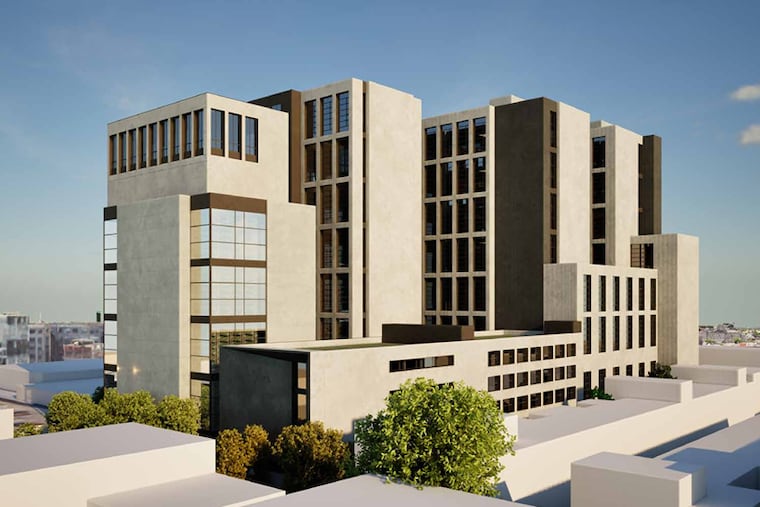An urban farm on Washington Avenue? Even the developer proposing it thinks it’s crazy
After running into pushback to an apartment proposal at 1601 Washington Ave., developer Ori Feibush has gone in a radically different direction (on paper anyway).

Real estate developer Ori Feibush has submitted a proposal to Philadelphia’s Planning Commission that show a mid-rise urban agriculture facility slated for 1601 Washington Ave., where he previously wanted to build 300 to 400 apartments.
The renderings show five of the project’s seven stories devoted not to residential development but instead to a use described as “nursery/greenhouse.”
So did Feibush suddenly develop a green thumb?
No.
“I didn’t read too many books to my children and decide to become a farmer,” Feibush said. “There’s really no substantive change in our long-term vision for the site, although even by my standards this is a wonky process.”
Feibush’s outlandish proposal is a response to the industrial zoning for the site, a remnant of Washington Avenue’s past as a warehouse- and factory-lined roadway. Additional zoning rules that date to 2015 ban many of the uses that would be traditionally allowed in an industrial area: storage facilities, auto sales, junk yards. Trucking terminals are also outlawed.
“It incredibly hard to find any permitted uses on the site,” said Feibush.
But why go to all this trouble — paying architects to design a huge greenhouse and zoning lawyers to present it to the city’s Civic Design Review committee — when Feibush has no real plans to build it?
The current proposal, like his earlier apartment plan, is seven stories tall. But Feibush fears further zoning restrictions to limit height on Washington Avenue so he wants to get this building permitted at its present size. Then he could seek relief from the Zoning Board of Adjustment (ZBA) after he can, in theory, convince neighbors to support a residential proposal.
“There is a greater than zero percent chance that while we are going through that process, additional overlays are introduced to Washington Avenue that further limit development rights,” Feibush said. “If we were to lose [at the zoning board] at the same time that the parcel is further downzoned, then we are in an impossible position.”
1601 Washington was previously home to Hoa Binh Plaza, a popular Vietnamese shopping complex that included a restaurant, bakery, and grocery store. In 2019 the business hub shuttered and was purchased by Streamline, another residential developer that was once ascendant in this corner of South Philadelphia and Center City.
But Streamline’s proposal for high-end townhomes fell apart amid the pandemic and the company’s larger struggles due to a tangle of lawsuits over the quality of their homes.
Then Feibush stepped in. His original plan for the site would have followed the existing pattern on the north side of Washington Avenue, where large residential developments have been taking the place of former commercial properties and vacant lots.
That trend has been met with determined opposition, however, as many near neighbors and community groups have pushed for more job-creating uses and, most of all, fewer new residents.
“There are individuals who do not want more density. Their concerns are about parking, about real estate taxes, about gentrification and socio-economic differences,” said Michael Showell, a member of the South of South Neighborhood Association, the most prominent community group in the area.
“I don’t think anyone wants the property to remain as it is,” Showell said, “but they don’t want this large of a [project].”
Feibush acknowledges that building an apartment complex here could take a lot of concessions and many fewer units than originally proposed.
And if he fails, well, everyone loves vegetables, right?
“There’s going to be a year-long process where we continue to push in support and hope to be able to secure the correct [zoning] relief here,” Feibush said. “And we’ll explore the strange plan with modifications if we completely fall on our face.”